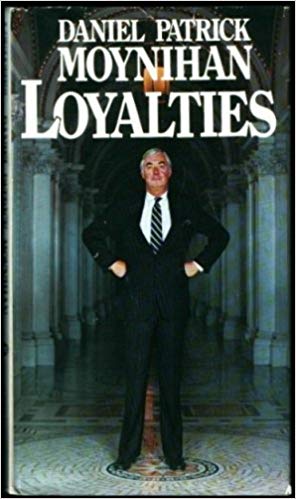Loyalties, New York: Harcourt Brace Jovanovich, 1984.
From the New York Times Review by Richard Bernstein:
The mind of Daniel Patrick Moynihan has ranged so nimbly over so many subjects that the senior Senator of New York may well be the foremost scholar-politician of the land. This slender volume, appearing midway through his second senatorial term, continues Mr. Moynihan’s tradition of elegant and original thinking on the big questions of the day. The Senator puts three subjects under scrutiny, all of them having to do with America’s role in the world and all of them related to the concept of loyalty – to nation, to good sense, to immutable principle – that the Senator sees his fellow citizens and politicians abandoning at our great peril.
Mr. Moynihan begins with nuclear arms, particularly last year’s Senate decision to authorize funds for the MX missile, a decision that the Senator, with no apologies for hyperbole, calls ”probably the most fatal mistake in our history.” Mr. Moynihan is no dove on defense. He believes that the massive buildup of nuclear arms by the Soviet Union has imperiled the American capacity to deter an attack. But the handling of the MX issue in the Senate is raised by Mr. Moynihan as one of many examples of the failure to deal intelligently with the Soviet challenge.
”The outcome was not decided by argument,” Mr. Moynihan writes of the Senate vote on the MX, a weapon that he thinks is both vulnerable and provocative. ”It was decided by routine,” in particular the reflex to vote in favor of new weapons’ systems demanded by the President.
He says that ”a sufficiently compelling sense of the principles that were at stake” was lacking from the Senate debate. There was an absence of moral sensitivity; there was, Mr. Moynihan says, no commitment to the concept of ”loyalty to life.”
In the second and third essays of this collection, one devoted to the nature of totalitarian ideology and the other to the role of international law, Mr. Moynihan searches through the thickets of a dangerous and menacing world for certain unchanging principles – loyalties – that can guide good policy. He is eloquent and persuasive in describing the way that world presented itself to him in the mid-1970’s, when as chief delegate to the United Nations, he witnessed what he regarded as the descent of the world body into utter cynicism and contempt for decent behavior. He cites, as the most obvious sign of this, the infamous, Soviet-inspired 1975 resolution equating Zionism with racism, but he believes that the real and ultimate target of tyranny is democratic values themselves. The Soviets are the villains, trampling on human rights, sending proxy Cuban forces into black Africa, twisting language and logic into their now familiar Orwellian shape. Mr. Moynihan clearly believes that a strong response is essential. But, he believes that both the Carter and Reagan Administrations have weakened the American response by reacting politically, emotionally or intemperately, rather than in accordance with certain established and defined principles of international behavior.
During the Carter years, Mr. Moynihan says, there was a profound confusion among American officials over their own country’s worth. In the United Nations, for example, ”the Carter diplomats took the view that if the majority of the General Assembly held some view, it must be right,” that if the third world, for example, held grievances against the United States, they surely were grounded in incorrect American behavior. This approach was tragically wrong, Mr. Moynihan says, citing the American vote in favor of a viciously anti-Israeli resolution in 1980 as a direct consequence of it. ”The degradation in the conduct of American foreign policy” in the Carter years, he says, came from a failure to perceive the nature of the enemy and thus to decline to defend American values and interests in unapologetic fashion.
The Reagan Administration is guilty of the opposite error, in the Moynihan view: ”Inasmuch as the Soviets dissemble and cheat and Lord knows what else, they were going to get a taste of their own medicine.” The Reagan team was, he adds, ”prepared to do anything to oppose Communism,” including covert operations and secret wars against sovereign countries (Nicaragua seems to be on Mr. Moynihan’s mind here) and an invasion of Grenada in order to change its government. The attitudes behind these actions amount to a ”Sovietization of American foreign and military policies,” which has the effect of making those policies ”devoid alike of ethical authority, political promise, or legality.”
A better approach, Mr. Moynihan argues, would be to restore a commitment to already existing international laws, which would provide clear guides for behavior and restore a sense of moral purpose.
That Mr. Moynihan refuses to allow certain principles, such as those of international law, to be sacrificed under any circumstances is intellectually and morally consistent. Yet, the Senator’s final recommendation to face our very dangerous world by renouncing certain types of actions seems, at least to this reader, inadequate.
In the real world, principles conflict with other principles. Would a covert operation against the legal government of Adolf Hitler in 1939 have been morally wrong? Mr. Moynihan would probably not argue that it would have been. Grenada, of course, is not Nazi Germany. Yet, principles conflicted there, too, the principle of the non-use of force, embodied in the United Nations Charter, with the principle of coming to the aid of people in dire need of it; there is also the principle that a country must be protected against forces unfriendly to it. In the end, the practical effect of Mr. Moynihan’s recommendation – though not the motive of it – could well be inaction in the face of the monstrous sorts of behavior he describes so well in this volume, and that would hardly be the loyalty that he feels.

